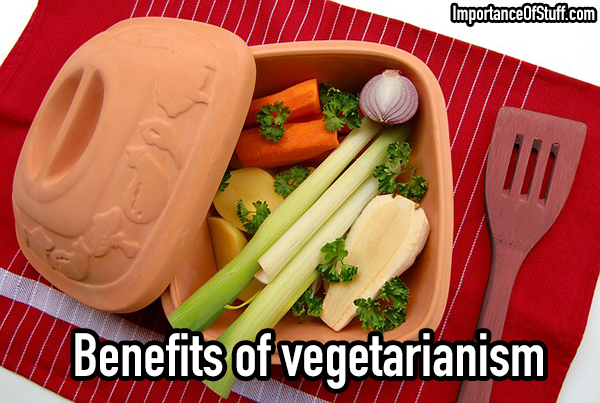A large part of the population of the world practices vegetarianism. Each day, more and more people are embracing this way of life. So what exactly is it like being a vegetarian? Basically, it means that you would not consume anything that is sentient. So, you would not be eating meat of any kind- be it derived from a land, avian, or marine animal. Insects also fall outside of your purview. For a long time, eggs were also considered non-vegetarian; however, many vegetarians today include eggs in their diet since an egg itself cannot be called sentient. So, a vegetarian diet includes mainly plant based foods, with a generous smattering of animal by products such as milk and milk-based items.

So what is the reason that an increasing number of people are adopting vegetarianism each day? In this article, let us see what benefits this way of life brings us.
Better heart health
Although definite results are yet to be derived, preliminary studies and surveys conducted have linked a vegetarian diet to better cardiovascular health. The reason is actually twofold: first of all, all animal diet includes some amounts of animal fat, which is actually something that is pretty harmful and best trimmed off from your meat. Consumption of animal fats leads to high amounts of cholesterol deposits in your blood vessels, paving the way for potential heart diseases. Vegetarian diet, on the other hand, contains very little in fats as long as you limit the consumption of dairy products, most of which contain a pretty high amount of unhealthy fats.
Rich in antioxidants
Secondly, most vegetarian foods contain a high amount of antioxidants. Antioxidants help in fighting the free radicals in the body, thus effectively preventing potential cancer cells. Antioxidants are also responsible for reducing the damage that can be caused by oxidative stress, such as atherosclerosis.
Fights obesity
Since most of the minerals and vitamins at we need to function can be found in plant based produces, nutrient deficiency is a rarity among vegetarians, which contributes to better metabolism. Hence, people who follow a vegetarian dit are also at a much lower risk of becoming obese or overweight. This is because most fruits, vegetable, eand grains contain a very high amount of fiber and other essential nutrients that help in boosting metabolism. Besides, most of the food that a vegetarian diet includes, such as fruits, vegetables, grains, and lentils, and very low in calories but high in fiber, which means that they take up a lot of volume and fills you up even when eaten in comparatively small quantities. So, you are less likely to binge eat, or reach for unhealthy snacks in between meals when you are following a vegetarian diet.
Prevents cataracts
Certain studies have found a link between two seemingly unrelated things: diet and eyesight. Although eating fish is considered good for your eyesight, according to the Nuffield Department of Clinical Medicine at the University of Oxford, studies have shown a link between a vegetarian diet and cataract development; vegetarians have a much lesser tendency to develop cataracts than meat eaters.
Improves mood
Strangely enough, a vegetarian diet has been linked with better mood as well. Usually, a vegetarian diet contains very low levels of arachidonic acid, something that is mostly found in animal meats. Arachidonic acid is known to suppress the happy hormones produced by the brain- serotonin and dopamine, and hence acts as a depressant. Since vegetarian diets include very less amounts of this acid, mood swings are less common among vegetarians. According to a research conducted in Benedictine University, restricting anal products and byproducts in a daily diet can lead to improved mood. This conclusion finds further credence in a study published by the Institute for Medical Research and Occupational Health in Croatia, which showed that lesser instances of neuroticism can be seen among people who follow a vegetarian diet.
Also read: Importance of nature
A major part of the world’s population is today embracing a diet based n vegetarian options. And there is no need to think that you will be nutrient deficient, because the nutritional quotient of fruits and vegetables is very high. Besides, there are alternatives for most meat based products and their nutrients in plant based foods. However, you must keep in mind, if you are thinking of adopting a vegetarian diet, that a sudden and drastic change in your diet will do you more harm than good. Make the shift gradually by replacing a couple of items at a time, and cutting down on your meat consumption slowly. That way, your body will acclimatize slowly and help you embrace vegetarianism in a healthy way.